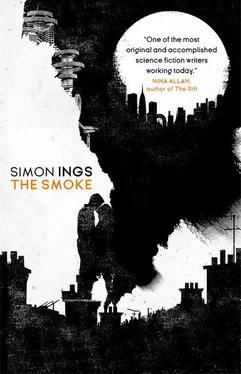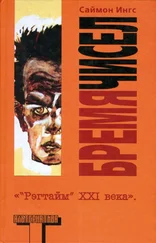DARE became for me another world entirely: imperilled, certainly, but in many ways happier than our own. It was a world without civil war, without nationalism, without tribes. It was a world that had never been exposed to Gurwitsch’s ray, a world in which the ray had not yet been discovered or, better yet, did not exist. It was a world whose dominant species was still one and entire: a single, healthy, well-bred human family.
A scream startled me out of my reverie. It came from the bottom of the garden. I leapt up, looked out, but it was still an hour before dawn and all I could see was my own face, reflected in the glass of the door. I ran outside. ‘Hullo?’
There was no reply. I hurried as fast as I dared down the garden. I’d taken my shoes off outside the hut and the dew soaked through my socks as I ran.
I found Fel catching her breath by the back door.
‘Fel? What are you doing here? Are you all right?’
She pointed at the path. ‘What is it?’
We were in pitch darkness. I stepped forward to trigger the outside light and there, in the centre of the path, frozen stiff as a garden ornament, was the toad that lived in the rockery wall. I bent down and made to take hold of it. It jumped between my feet. I chivvied it away.
I took Fel in my arms and kissed her. ‘What are you doing here?’
‘I thought I’d surprise you.’
‘Darling. Come see the hut.’
She pulled back against my hand. ‘Not up there.’
‘Come on.’
‘I’m scared,’ she said, pouting, only half in jest.
I laughed, put my arm around her and led her into the cottage. ‘I’ll make you a coffee. How come you’re so early?’
We spent the next four days together. I would wake at four and work in the hut until daybreak. We would breakfast in the garden around nine, and then I would go back and work into the early afternoon, when we would visit some town or other, some castle or stately home, that Fel had spotted in the guide she had bought. I tried to take her walking with me but the countryside bothered her. Things kept moving about in her peripheral vision: sheep, cows, crows, tree branches bending in the wind. She was always tripping over roots, stones, her own laces. She was not equipped for the natural world and lacked the lore necessary to survive it. If a cow’s in your way, wave at it and keep walking. Stand still for a wasp, and check the rim of an open can before raising it to your lips. ‘It stung me! It stung !’ I kissed away her tears but Fel was not to be comforted. ‘Let’s go back. Urgh! There’s another one!’
‘That’s a bee.’
‘I don’t like the outside. The outside is mean.’
The paper guide she had bought in Ludlow was exhaustive, but Fel missed the Bund’s information glut. The day we went to Stokesay Castle, she asked me: ‘How do we know if it’s going to be busy?’
‘It’s Saturday. It’s a castle. It’s going to be busy.’
‘But what if it’s too busy?’
‘Then we’ll queue or we’ll go somewhere else. Come on, Fel.’
She carried her absurd do-everything, know-everything phone around wherever we went, though a lack of signal rendered it virtually useless. The phone had a camera in it so her carrying it around made some sense. She worried about losing it, though. ‘Nothing’s backing up,’ she explained.
‘It’s your phone. It’s in your hand. Why would you lose it?’
‘I just don’t want to lose our pictures.’
‘You’re not going to lose them.’
‘Don’t be angry.’
‘I’m not angry.’
When we got home, she made me sit with her and look through her camera roll, for all the world as though the day recorded there had not already happened.
‘Nice. Good one. Yes.’ I had no idea what I was supposed to say.
When it was time to return to London, Fel dialled a number on the house phone, listened, dialled some extra numbers and put down the receiver: ‘All done.’
In the evening, a car drew up outside the door. It was large, white, brand new and unlike anything I had seen before. There was no driver. We put the luggage in the boot and climbed in. The interior smelled of leather polish and new plastic. This is how Fel had managed to arrive so early, the morning she came to the cottage: she had booked one of these vehicles for herself and slept the whole way. She snuggled against me as our vehicle wound steadily through narrow country lanes to the M54. I clutched at her, petrified. The motorway was worse. I was convinced we were going to crash. How can a car have no driver? I cricked my neck craning to see out of windows dialled dark against the street-lamp glare.
When we got back to the Barbican, I was so tired I had to go straight to bed. The mattress felt as if it was moving in waves under me.
‘No one need be too surprised by the pace at which we build,’ Georgy Chernoy had said, over dinner in Windsor Castle. ‘The rules by which we operate are no different from the rules that have pertained to progress, fecundity and expansion on this planet since life began. They are no different, if I might for a second speak as a Bundist–’ (a strange thing to say, since to my knowledge he never did anything else) ‘–no different from those which led our unaccommodated forebears to their own achievements.’
Even Stella, who had sat shiny-eyed through his whole performance – wrapped up in his vision, or at any rate spellbound by his delivery – admitted to me later that Georgy Chernoy’s noblesse oblige at this point had made half the room suck its teeth.
Oblivious, Chernoy had continued: ‘I say “rules”, but there is only one rule, and everything follows from it. Not a rule, even, but a simple mathematical truth. I mean the exponential function.’
If the Bund has deviated from the general course of human progress, it is through their knack of comprehending, embracing and exploiting the consequences of the exponential function.
‘And how strange that humankind, the tool-builder, the city-maker, the census-taker, should be always tripping over such simple mathematics!’
Here Stella’s report broke off in typical style: ‘Oh, I’ve no head for numbers!’
I had just got back from Shropshire and Stella was treating me to one of those expensive hotel teas she so enjoyed. It was May, the first anniversary of my meeting Fel, which meant it was also a year to the day since the dinner at Windsor Castle. This was how we got talking about Georgy Chernoy and how I came to hear, slightly garbled and second hand, a speech Fel and I had missed. ‘Something about how things double every few years. You must know all this from your college work.’
I poured milk from a silver jug into Stella’s cup. ‘I just spent a whole month in Shropshire drawing curves. That doesn’t mean I understand them.’
‘Curves! Yes! He talked a lot about curves. About how the Bund thinks in curves. It all sounded rather pretentious, if you ask me.’
Had Georgy Chernoy sought a living example of general mathematical myopia, he could not have found a better subject than Stella. I remember thinking darkly: perhaps this is exactly what he has done – picked her as a sort of glamorous mascot of human limitations. A human pet he can watch as she paces stereotypically back and forth, back and forth, against the plate glass of her own incomprehension.
Chernoy’s point – and it was a valid one, however galling – was that some vital truths about the world, though well known and widely broadcast, absolutely refuse to stick in the unaccommodated mind. They are well understood, and yet they invariably fail to inform action.
Multiply the natural logarithm of two by a hundred and you get seventy, or as near to seventy as makes no odds. Divide that number by growth expressed as, say, so many per cent per year, and you get the number of years it takes for a steadily growing thing to double in size. A tree growing at five per cent a year will double in size every fourteen years.
Читать дальше












